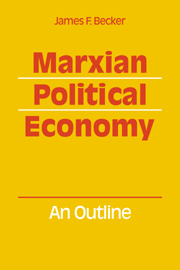Introduction
Published online by Cambridge University Press: 07 October 2011
Summary
Scientific inquiry and the materialist standpoint
Despite the striking worldwide revival of theoretical Marxism – a revival whose signs include a heightened flow of books and monographs, some increase in the number of courses of academic instruction in colleges and universities (not unopposed), a growing volume of discourse in the media, and so on – a study such as this requires some explanation. Its subject is the rather formidable one of Marxian economics and its applications to political economy, a field only partly lit and from which mists of incantation now and again arise.
While Marx spent the great bulk of his energies as a mature scientist in precisely this realm of inquiry, much of the current revival has centered, curiously enough, on political (Frankfurt school,) social psychological (psychologists and alienation theorists), sociological (“new class” theorists), or other theories. My intention, however, is to follow Marx's own lead, to reconstruct his economic theories, and to use them to analyze the advanced capitalism. The goal is to explain the present phase of development in those countries and regions where the mode first put in its modern appearance and within which it is now entering its dotage. Eventually, we shall come to an assessment of the present state of class structure and relations and to an assessment, indeed, of the very hypothesis of class struggle itself. Is such a struggle at the center of the process of social change in the advanced context?
- Type
- Chapter
- Information
- Marxian Political EconomyAn outline, pp. 1 - 16Publisher: Cambridge University PressPrint publication year: 1977



